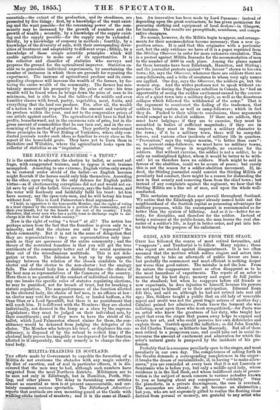THE ELECTIVE FRANCHISE " A TRUST."
Ix is the custom to advocate the election by ballot, or secret suf- frage, with exaggerated truisms, and to oppose it with truisms misapplied. According to one extreme, English virtue only awaits to be restored under shield of the ballot—as English heroism might flourish if the heroes could only hide themselves. According to the other, open voting is the only defence for English public virtue—as if electioneering corruptions did not and would not ex- ist save by aid of the ballot. Give secrecy, says the ballot-man, and the voter will fearlessly and faithfully fulfil his trust: let him have secrecy, say the open-vote-men, and he will betray his trust without fear. This is Lord Palmerston's final argument-
" I hold, in opposition to the honourable Member, that the right of voting is a trust reposed by the constitution in a portion of the community, not for their own benefit, but for the benefit of the rest of the country. I hold, therefore, that every man who has a public trust to discharge ought to dis- charge it in the face of the whole country."
Now is the right of voting "a trust" at all ? The notion has perhaps arisen from the fact that the franchise is given only to a minority, and that the electors are said to "represent" the whole community. But it is not in the sense of delegation that they are representatives : they are representatives only inas- much as they are specimens of the entire community ; and the theory of the restricted franchise is that you will get the true sentiments of the community better out of the sound specimens than out of the miscellaneous multitude. This is not dele- gation or trust. The delusion is kept up by the apparent analogy between the relation of the chosen candidate to the elector and of the elector to the non-elector : but the analogy fails. The electoral body has a distinct function—the choice of the best men as representatives of the Commons of the country.
Here there is no question of the conduct of individual electors. If any one breaks the specific rules of statutes regulating elections, he may be punished, not for breach of trust, but for breaking a statute regulation. The non-performance of the function allotted to the electoral body, the choice of bad men, is no offence at law : an elector may vote for the grossest fool, or landed buffoon, a Sir Oran Otan or a Lord Spoonbill, but there is no punishment that will reach him. It is different with the Members: they are elected individually, not decreed in the lump as a class by the supreme Legislature ; they must be judged on their individual acts, by their constituents ; and if they were to have the shield of the ballot, which Lord Palmerston almost claims for them, the con- stituency would be debarred from judging the delegates of its choice. The Member who betrays his trust, or displeases his con- stituency, is disposed of by the refusal to reelect him : if the electoral body proves too incapable or too depraved for the function allotted to it corporately, the only remedy is to change the elec- toral body.


































 Previous page
Previous page